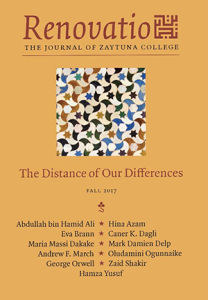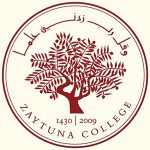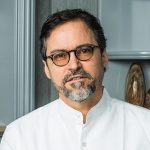Renovatio Journal 2 (Vol.1, No.2 Fall 2017): The Distance of Our Differences

Editor-in-Chief: Hamza Yusuf
Publisher: Zaytuna College
Year of Publication: 2017
Print Length: 107 pages
Genre: Islamic Studies / Theology, Ethics and Philosophy; Hadith, Sunnah & Sirah, History, Science, Quranic Studies; Non-Fiction / Religious Studies
Topic: Muslim, Islam, Qur’an, Consumerism & Entertainment, Ethics & Morality, History, Humanity; Modernity, Modernism, Modern; Postmodernity, Postmodernism, Postmodern; Religion, Religious Thoughts & Philosophy, Scholarship & Knowledge, Cultural Heritage/Legacy, Communication, Dialogue, Similarities & Differences, Tolerance, Art & Design, Pluralism, Nationalism, Racism
Renovatio (renovatio.zaytuna.edu) is a Muslim journal about the ideas that have shaped our past and present world. We ask scholars, theologians, and writers to examine timeless questions and today’s moral challenges by drawing from the enduring texts of revelatory faith traditions and current thinking from philosophy, theology, and ethics to history, politics, the social sciences, and beyond.
Vol.1 No.1: The Distance of Our Differences
Our second issue focuses on the themes of pluralism and tolerance, considering that we live in a time when we are challenged and shaped by varied beliefs and practices. This Fall 2017 issue of Renovatio seeks to foster fruitful conversations that can help us arrive at a truer measure of the distance of our differences.
Table of Contents
Contributors
0. Letter from the Editor – Hamza Yusuf
Despite the diversity of our countless creeds, colors, and cultures, our society has been subsumed into a monoculture of ersatz arts, entertainment, and consumerism. How can we recapture humanity’s once extraordinary individuality?
1. Wisdom in Pieces – Caner K. Dagli
Science, philosophy, and art have been blown apart, and our conversations have devolved into chaos. How do we begin to learn the art of disagreement?
2. The Silent Theology of Islamic Art – Oludamini Ogunnaike
To many, Islamic art can speak more profoundly and clearly than even the written word. Is it wiser then for Muslims to show, not to tell?
3. The Pinocchio Within Us – Hina Azam
Despite seeming differences, Pinocchio’s reality may almost be identical to our own, even if our noses do not threaten to grow longer at very misdeed.
4. Rules of Engagement – Maria Massi Dakake
In religious dialogue, are virtue and good manners (adab) ultimately as important as, or perhaps more important than, the eloquence of words and the rigor of arguments?
5. Where Islam and Nationalism Collide – Zaid Shakir
Islam contains teaching that clearly argue against the most important elements of nationalism.
6. Notes on Nationalism – George Orwell
The abiding purpose of every nationalist is to secure more power and more prestige, not for himself, but for the nation or other unit in which he has chosen to sink his own individuality.
7. Beyond Racism – Abdullah bin Hamid Ali
In the absence of a critical assessment of the reality of race and racism in the history of Islam, Muslims remain susceptible to accepting broad generalizations of a colorblind Islamic history.
8. Among the Disbelievers – Andrew F. March
How does the “radical other”—the unbeliever, and not merely the wayward Abrahamic cousin—figure in Islamic discourses on toleration and coercion?
9. Great Books and Small Colleges
10. We present a new Renovatio series on liberal arts education at small colleges.
Liberal Education at Zaytuna College – Mark Damien Delp
Liberal Education at St. John’s College – Eva Brann
About Zaytuna College

Zaytuna College was founded in Berkeley, California, with a mission to educate and prepare morally committed professional, intellectual, and spiritual leaders who are grounded in the Islamic scholarly tradition and conversant with the cultural currents and critical ideas shaping modern society, through a traditional liberal arts education.
Source: https://zaytuna.edu/about
More from Zaytuna College in this library, click here.

Hamza Yusuf is president of Zaytuna College in Berkeley, California, the first accredited Muslim liberal arts college in the United States. A leading proponent of classical learning, the traditional liberal arts, and great books education in both the Western and Muslim traditions, he has translated, authored, and coauthored numerous publications, including scholarly books and articles as well as papers on major current areas of ethical concern. He holds traditional advanced degrees (ijazaat) in Islamic law and theology, as well as a BA in Religious Studies (San Jose State University) and a PhD from the Graduate Theological Union in Berkeley, California.
Source: https://sandala.org/pages/about-us
More from Hamza Yusuf in this library, click here.
